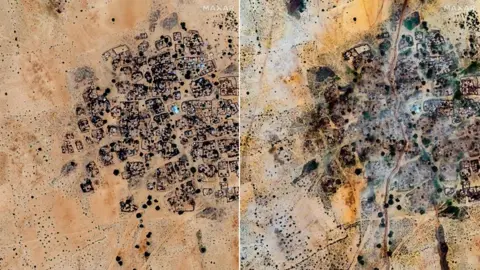The historic Acropolis in Athens has announced a temporary closure on Tuesday due to an intense heatwave affecting Greece. The closure, implemented by the country's culture ministry, will last from 13:00 to 17:00 local time (11:00 to 15:00 BST) as temperatures are expected to peak at around 42°C (107°F).
This decision follows warnings of extreme heat as parts of Greece faced a category four wildfire alert, indicating a very high risk in multiple regions. This situation comes amidst ongoing wildfires in other parts of Europe, notably France and Spain’s Catalonia region, as the continent bears the brunt of a deadly heatwave that has confronted various nations in recent weeks.
Changes to the Acropolis’ operating hours were made after a surge in temperatures began on Sunday, and this isn’t the first time the ancient site has closed due to severe weather—similar measures were taken last summer and in June. Authorities emphasized that maintaining safety for visitors and workers is paramount, especially considering that the Acropolis attracts millions of tourists annually, projected to be around 4.5 million in 2024.
To further ensure worker safety in the sweltering conditions, Greece's labor ministry has mandated a five-hour work stoppage for outdoor manual laborers in the most affected areas from 12:00 to 17:00 on Tuesday. The current heatwave is forecasted to persist through Wednesday, with temperatures predicted to range between 40-42°C in southern regions before easing on Thursday.
In tandem with the heat concerns, Greece's fire service reported 41 wildfires had ignited across the country on Monday, though 34 were contained early and seven remained active into the evening. The civil protection bureau issued a Category 4 wildfire warning for five affected areas: Attica, Peloponnese, central Greece, Thessaly, and western Greece, urging vigilance among the public with emergency services standing by.
Elsewhere in Europe, approximately 1,000 firefighters have been engaged in combating a blaze in southwestern France, prompting evacuations in Narbonne and closing a key motorway that connects France and Spain. Meanwhile, over 2,000 residents in Catalonia were placed under lockdown as wildfires in Tarragona continued to rage, underscoring the extensive impact of the heatwave across the region.
The United Nations’ Intergovernmental Panel on Climate Change has highlighted that heatwaves are expected to become more frequent and severe due to human-induced climate change, making this summer's extreme weather an urgent wake-up call for global environmental action.
This decision follows warnings of extreme heat as parts of Greece faced a category four wildfire alert, indicating a very high risk in multiple regions. This situation comes amidst ongoing wildfires in other parts of Europe, notably France and Spain’s Catalonia region, as the continent bears the brunt of a deadly heatwave that has confronted various nations in recent weeks.
Changes to the Acropolis’ operating hours were made after a surge in temperatures began on Sunday, and this isn’t the first time the ancient site has closed due to severe weather—similar measures were taken last summer and in June. Authorities emphasized that maintaining safety for visitors and workers is paramount, especially considering that the Acropolis attracts millions of tourists annually, projected to be around 4.5 million in 2024.
To further ensure worker safety in the sweltering conditions, Greece's labor ministry has mandated a five-hour work stoppage for outdoor manual laborers in the most affected areas from 12:00 to 17:00 on Tuesday. The current heatwave is forecasted to persist through Wednesday, with temperatures predicted to range between 40-42°C in southern regions before easing on Thursday.
In tandem with the heat concerns, Greece's fire service reported 41 wildfires had ignited across the country on Monday, though 34 were contained early and seven remained active into the evening. The civil protection bureau issued a Category 4 wildfire warning for five affected areas: Attica, Peloponnese, central Greece, Thessaly, and western Greece, urging vigilance among the public with emergency services standing by.
Elsewhere in Europe, approximately 1,000 firefighters have been engaged in combating a blaze in southwestern France, prompting evacuations in Narbonne and closing a key motorway that connects France and Spain. Meanwhile, over 2,000 residents in Catalonia were placed under lockdown as wildfires in Tarragona continued to rage, underscoring the extensive impact of the heatwave across the region.
The United Nations’ Intergovernmental Panel on Climate Change has highlighted that heatwaves are expected to become more frequent and severe due to human-induced climate change, making this summer's extreme weather an urgent wake-up call for global environmental action.




















